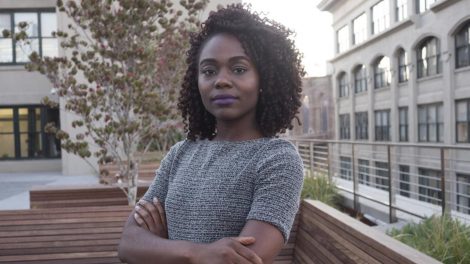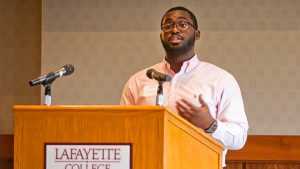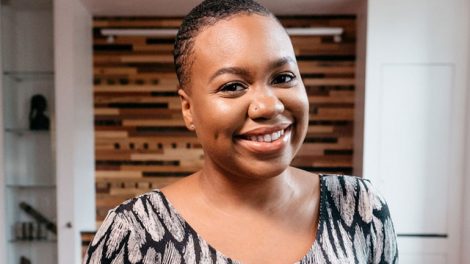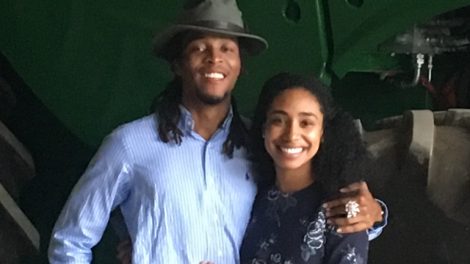
Jan 26, 2018
The Power of Connections
In her day job managing external communications from the New York office of Andela, an African tech startup, Dami Oye ’15 is able to merge her love for…
By Stephen Wilson
A group of 46 young men, hair coiffed and bow ties straightened, sit in a lecture hall. They are freshmen at Liberty High School in Bethlehem, Pa., and have come to Lafayette to listen, learn, and lead.
They are the first cohort at their school in a new freshman seminar designed to inspire students to push beyond their boundaries and develop into leaders.
The class is the brainchild of their principal, Harrison Bailey III ’95. As former captain of a champion Lafayette football team and co-chair of the Brothers of Lafayette, he knows a thing or three about leadership.
Bailey has a strong allegiance to the College as the place where he faced adversity, formed strong bonds, and grew in mind, body, and spirit.
The young men in the class face similar hurdles and are developing tools to best them.
Liberty High School is home to nearly 2,800 students. Fifty percent are African American and Latino; 50 percent are economically disadvantaged. And academic performance is moving in opposite directions; girls are trending upward while boys are trending downward.
Bailey is bending that curve.
“I expect to see these young men in more AP honors classes, shoulder more responsibilities in their activities, athletics, and student government, and set an example for future classes,” says Bailey.
That course seems inevitable as they meet with a first-year dean, tour campus, and participate in a student panel.

Robert Young ’14
Robert Young ’14 kicks off the morning session. As associate director of Annual and Leadership Giving, Young is eager to share his story and provide some tips and tricks as the students look at colleges. He fields a few questions about classes—when they meet, which are mandatory, and what are the most popular.
Bailey chimes in as the discussion turns to the social aspect of college. Young tells the group that each of them will have to find the balance between study and fun because they are accountable for those choices.
Their teacher, Wayne Whitaker, asks Young to repeat that last sentence. Many of the students jot it down in their notebooks.
“One of my goals with today’s visit is to help turn these young men from college eligible to college ready,” says Whitaker. “But to do that, they need to learn how to navigate here, to fill their tool belt today with academic advice and to apply it to high school.”
Young then introduces Dean Brandon Morris who oversees 680 first-year students at the College. He outlines what he does to prepare incoming students and position them for success. Morris starts in May, talking to the new class about their majors, courses, and schedules.
When class members arrives in August, he works to align each one with an academic adviser, peer mentor, and support team. His goal: To help students be patient with themselves as they transition but also to learn what they are passionate about.
Morris relays his college story, starting as a chemical engineering major before switching to sociology… in large part thanks to his adviser, the position he now holds.
The students soon pepper him with questions … not just questions about degrees, time management, or campus, but about life, like the biggest challenge before them.
“The biggest challenge you will face is finding the confidence within yourselves to know you belong here,” Morris says. “You will face struggles when that first class hits you, and you stress over the work or adjust how you study and learn. In those times, you can’t forget how talented you are.”
Another big question: Sacrifices.
Morris sets them straight by talking about his own experience. “College is all about sacrifices. I had to learn to regulate how much Madden football I played,” he says. “It is about what you decide to cut out, saying no to friends, video games, and fun. It’s about you deciding when it is time to use office hours, hit the library, and study. It is about self-control as you do the work and take responsibility for adult tasks like cooking, cleaning, and laundry. You have to be confident in the choices you’re making.”
Bailey and Whitaker nod and ask for more sentences to be repeated as Young speaks.
“Our students are running a marathon, not a sprint,” says Whitaker. “They are engaged, but as the rigor increases, they wear down. Days like today help pick them up and help them grow.”
Today is about growth. For many of the students, today’s visit is their first time on a campus. For a few, it is the first time they’ve stepped out of their neighborhood. But these young men, diverse in color, background, and ability, were selected for the seminar by teachers and administrators who saw real potential.
“They can benefit from being here and from some guidance on leadership,” says Bailey. Being here is an important idea for Bailey. “I believe it is crucial to give back to the College and stay engaged,” he says. So today’s visit brings him full circle: The education he received here and relationships he built are now shared with others, inspiring future Leopards.
With him as a mentor, they should succeed. He was the third African American administrator in the district and first African American principal in Liberty’s history. He is enrolled in a doctoral program, studying minority male students in advanced placement and honors courses. And he is a national and world champion and record holder in Highland Games competitions.
He knows what it takes to set goals, train, and win. This seminar and these young men will no doubt make him proud.

In her day job managing external communications from the New York office of Andela, an African tech startup, Dami Oye ’15 is able to merge her love for…

Randi Gill-Sadler, first-year Lafayette assistant professor of English, has seen what she calls “the underbelly of America,” how the U.S. has taken…

When Kai Nielsen ’11 graduated from Lafayette College, his subsequent visits back home to St. Croix were eye-opening. He began to watch the place he…